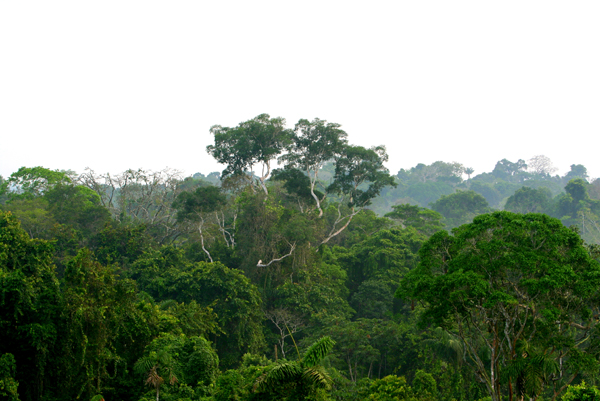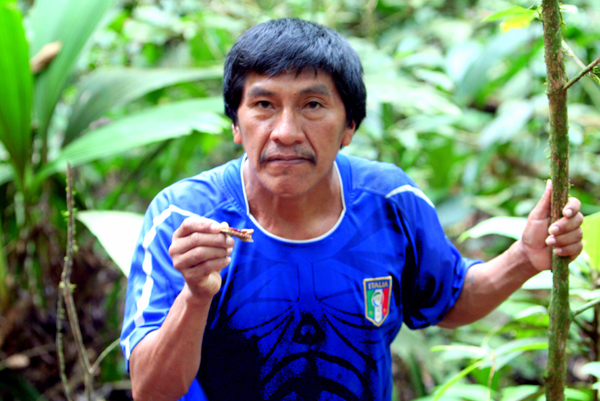Jeremy Hance
mongabay.com
December 10, 2013
Last Wednesday, the government of Ecuador shutdown the indigenous rights NGO, Fundación Pachamama, in Quito over the group’s opposition to oil drilling in indigenous areas. More than a dozen government officials showed up at Pachamama’s office with a resolution by the Ministry of Environment that officially dissolved the organization, the first such moved by the government which in June passed an Executive Decree that tightened governmental oversight of the country’s NGOs.
The Ecuadorean government, under Rafael Correa, contends that Pachamama was involved in physically harassing an ambassador from Chile and a businessman following a recent presentation on oil concession in the Amazon. But Pachamma denies the allegations, instead accusing the government of violence.
“We reject violent demonstrations that come from any sector. We neither support nor engage in any violent act. We cannot be blamed for acts in which we have not participated,” Maria Belén Páez, the president of Fundación Pachamama, said in a statement. “For our work in defending rights, we have been attacked publicly and violently by those who hold political power, and this has been widely disseminated by the media under government control. That is violence. It is also violence to dissolve an organization unexpectedly, without legal cause, without due process that guarantees self-defense.”
Pachamama says it will take its case to court and file an appeal to the InterAmerican Commission on Human Rights. Pachamama, which is the name of an indigenous Earth goddess, works to empower Amazonian communities.

Forest canopy in Yasuni National Park. Photo by: Jeremy Hance.
According to the Correa Administration, Pachamama violated two regulations of the recent Executive order: “Deviation from the aims and objectives for which it was created” and “Engaging in political activities reserved for political parties and movements registered in the National Electoral Council, that affect the public peace or that interfere in public policies that threaten the internal or external security of the state.”
Critics say the Ecuadorean government has been increasingly hostile to freedom of speech and that the Executive Decree threatens the ability of non-governmental organization to operate.
“This closure [of Pachamama] is an arbitrary act that seeks to suppress our legitimate right to dissent from the decision of the National Government to concede areas of Amazonian indigenous nations to oil companies, without respecting their constitutional rights and to free, prior and informed consultation,” says Belén Páez.
The government of Ecuador depends heavily on oil exports for its revenue with oil accounting for around 40 percent of the country’s exports currently. But extracting oil from the Amazon has come with massive environmental and social impacts, much of it borne by the country’s indigenous populations. Earlier in the year, Ecuador’s government dropped its ambitious plan to spare oil drilling from three blocs in Yasuni National Park, which scientists say is quite possibly the most biodiverse place on the planet. Dubbed the Yasuni-ITT Initiative, the government had proposed to forgo drilling if the international community paid approximately half of expected oil revenues, amounting to $3.6 billion. However, money didn’t come in fast enough for the government and in August they announced they were canceling the initiative and drilling would start next year. Oil drilling is already occurring inside other portions of Yasuni National Park.
The planned drilling in Yasuni threatens indigenous people who have chosen to remain disconnected from the outside world. Meanwhile, critics contend that ongoing oil drilling and concessions in other parts of the country is occurring without the proper consultation of the indigenous tribes in the area.
“This is a violation of the collective rights of indigenous Amazonian peoples and the rights of nature, for an oil round that is against the will of the rightful owners of the affected territories, through a process of ‘socialization,’ not a consultation,” says Belén Páez.
Read more at http://news.mongabay.com/2013/1210-hance-pachamam-shut-down.html#FdaFxmuFFxHpVff6.99

Indigenous guide in Yasuni National Park. Photo by: Jeremy Hance.
